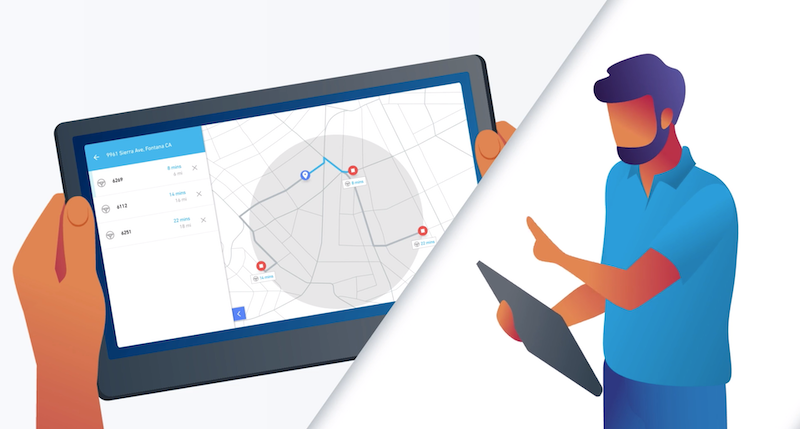GPS (Global Positioning System) technology is one of the most innovative inventions of our time. As it continues to advance, more fleets around the world are using it to get driving directions and to monitor their vehicles.
But despite widespread use, many people don’t know exactly how a GPS tracker works and aren’t aware of the different use cases they enable.
Read on to learn more about how GPS tracking works and discover a few key benefits of this technology.
What is a GPS tracking device?
A GPS tracking device is a portable unit that allows users to monitor and track its location. These devices are most commonly used in vehicles as car tracking systems.
While tracking devices are similar to in-car navigation systems, there are a few key differences. GPS navigation systems show drivers their location on a digital map and then provide driving instructions to get to a designated point. On the other hand, GPS trackers use GPS technology to track a vehicle’s current location and trip history. The GPS data is then broadcasted to a computer, smartphone, or tablet.
How do GPS trackers work?
GPS trackers connect to a series of satellites to determine location. The tracker uses a process called trilateration which uses the position of three or more satellites from the Global Navigation Satellite System (GNSS) network and its distance from them to determine latitude, longitude, elevation, and time.
Learning how to work a GPS tracker is simple. In the vehicle, the tracker will usually be powered by the onboard diagnostics (OBD-II) connector, a cigarette lighter, accessory socket, or an internal battery. The information it collects is then transmitted to the software that allows the user to aggregate and analyze the data.
How do GPS trackers work with the software? Some are active trackers, meaning that they are able to provide users with a real-time view of global positioning. This type of tracker can be looped into a managed service.
Passive trackers are usually less expensive than active ones as they simply store the GPS data to be viewed at a later time.
How are GPS trackers used?
GPS trackers are used by fleet managers and vehicle owners to track the location of their vehicles. GPS tracking systems can provide useful information in a number of scenarios for fleet managers, such as:
-
Tracking business data: Business owners and fleet managers who oversee vehicles on a regular basis can use GPS fleet tracking to monitor their movement and track mileage. This is helpful in understanding where employees and vehicles are at a given moment, or where they have traveled throughout the day.
-
Vehicle location reporting: If a vehicle is stolen and has a GPS tracker installed, its location can be reported to the authorities who can recover it more quickly.
GPS tracker benefits for fleets
Fleets who effectively use their GPS tracking tools are often able to see benefits in their overall business processes. For instance:
-
Improved customer service: With real-time fleet status, a fleet manager can help deliver a quality customer experience by providing more accurate arrival times and identifying the closest driver to a service call.
-
Optimized routing: GPS data can help fleet managers understand traffic and road conditions to dispatch their drivers on more efficient routes
-
Increased cargo security: GPS tracking systems can help replay a route to help fleet managers concerned about cargo theft spot unauthorized trips. Most fleet tracking systems allow the setup of geofences that can alert to a vehicle’s whereabouts when it leaves a certain location or boundaries.
-
Understanding driving behavior: With an engine control module (ECM) connection, fleets can also monitor certain driving habits, alerting managers to behavior that drivers can be coached on.
Beyond basic GPS fleet trackers, fleets have also started to use vehicle video to enhance their fleet management. By adding video to their GPS tracking system, fleets can:
-
Use both GPS data and video confirmation to ensure goods are delivered or services are performed accurately and on schedule.
-
Obtain video evidence of vehicle damage or missing equipment
-
Protect drivers and company reputation with captured video of collisions
GPS communication and fleet management
Fleet managers can benefit from GPS technology as they work to build a better, more efficient business.
How does a GPS tracker work for businesses? Using GPS tracking technology, the Lytx Fleet Tracking Service helps fleet managers better manage their company vehicles.
This means that fleet managers can:
-
Get an alert when an employee is deviating from a specified route or area (also known as geofencing)
-
Adhere to safety standards with vehicle speed data
-
Know if a vehicle is used after business hours, helping to protect company property
-
Plan more efficient routes for drivers to improve company profit and better serve customers
Source: https://www.lytx.com
CUT COTS OF THE FLEET WITH OUR AUDIT PROGRAM
The audit is a key tool to know the overall status and provide the analysis, the assessment, the advice, the suggestions and the actions to take in order to cut costs and increase the efficiency and efficacy of the fleet. We propose the following fleet management audit.




